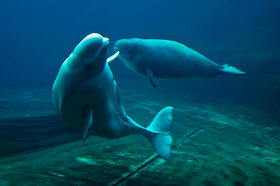Animal Advocate: Ga. Aquarium Will Lose Beluga Whale Case

A marine scientist with the Animal Welfare Institute is predicting the Georgia Aquarium will lose its bid to bring 18 wild-caught beluga whales from Russia to the United States.
A federal judge will hear oral arguments in the case Friday in Atlanta. It’s the latest action in the case that stretches back to 2012 when the aquarium first filed an application to bring the whales to the U.S. The National Oceanic and Atmospheric Administration, or NOAA, denied the application in 2013, prompting the Georgia Aquarium to file a lawsuit.
Marine scientist Naomi Rose said during an interview on “A Closer Look” that she supports NOAA’s rejection of the aquarium’s bid.

Rose said NOAA denied the permits because the Georgia Aquarium failed to meet legal standards necessary for bringing the whales to the U.S.
“They did not sufficiently explain how this import would be sustainable. … They did not sufficiently explain how this import would not lead to additional takes and would not lead to additional harm to the population.”
Russia captured the 18 belugas from the northern Russia Sea of Okhotsk between 2006 and 2011, according to NOAA. The whales are currently held at the Utrish Marine Mammal Research Station on Russia’s Black Sea Coast.
The vice president of Georgia Aquarium external affairs and government relations, Scott Higley, told WABE that “belugas are in trouble and that an aquarium setting would offer protection for the mammals.”
“As scientists, it’s really important for us to have them in a zoological setting because we’re trying, we’re trying to find out why all of these things are happening so we can work to conserve and protect them in their natural habitat, and a lot of the work that we need to do and information that we need to compile can only be done in a zoological setting,” Higley explained.
But Rose disagreed. “Very little critical work for conservation is being done in zoological settings … whales, dolphins and porpoises have a lot of differences when they’re in captivity, both physiological and behavioral,” Rose countered.
“So they’re not necessarily the best models for what’s going on out in the wild,” she added.
At least five beluga whales have died at the Georgia Aquarium over the past several years, including a month-old beluga calf this spring.
“The unfortunate situation with our calf was primarily due to a genetic issue that that animal experienced, and the thing is death is a part of the natural life cycle,” Higley said.
Critics of the bid to bring the captured belugas not only to the Georgia Aquarium but also to others around the country say it would set a dangerous precedent.
“It is, to me, reprehensible that the Georgia Aquarium is pushing the U.S. to become a partner in this trade, in this inhumane and unsustainable trade,” Rose said.
If the judge rules in favor of the Georgia Aquarium’s bid for a permit, Rose said she fully expects NOAA to appeal the ruling. “But for what it’s worth, and it’s just my personal opinion, the Georgia Aquarium isn’t going to win this case.”
Beluga whales are social animals that typically migrate, hunt and interact together in groups of 10 to several hundred in the Arctic and subarctic waters of Russia, Greenland and North America, according to NOAA statistics. The whales also face threats including ship strikes, pollution, habitat destruction and entanglement in fishing gear.
WABE’s Eboni Lemon, Rose Scott and Denis O’Hayer contributed to this report.
9(MDAxODM0MDY4MDEyMTY4NDA3MzI3YjkzMw004))







